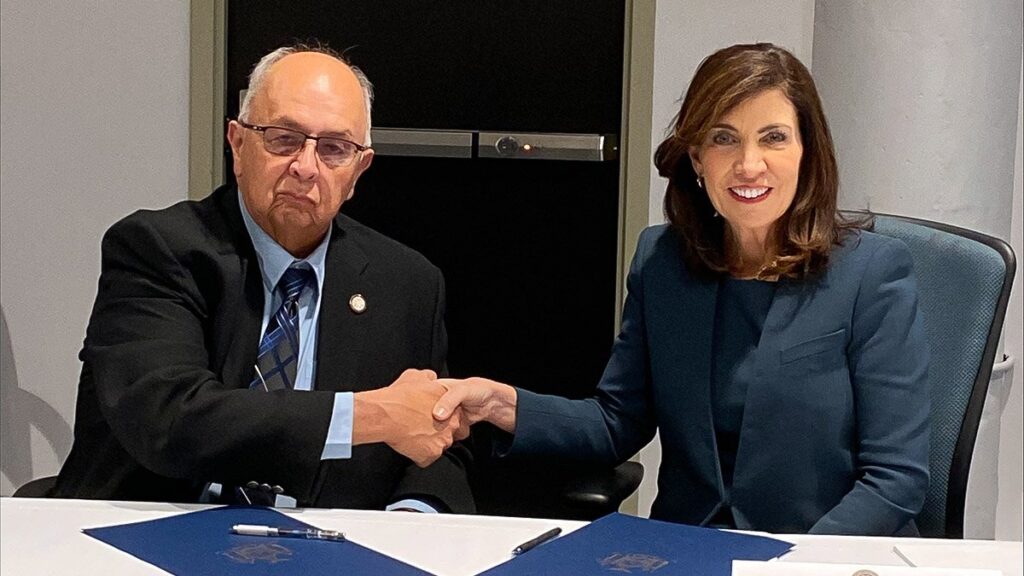The Seneca Nation of Indians and New York State have mutually agreed to a short-term extension of the tribe’s current gaming compact.
Governor Kathy Hochul and Seneca Nation of Indians President Rickey L. Armstrong, Sr. met in Buffalo and signed an extension of the current gaming compact, which expires December 9, 2023, according to a statement from the governor’s office.
The extension runs through March 31, 2024 and will automatically renew unless one of the parties decides not to renew it or a new gaming compact is agreed upon. The terms of the compact are unchanged from before and both sides will be meeting again in the coming weeks to continue negotiations on a long-term compact.
“Over the last several weeks, our discussions with New York State, including face-to-face meetings with Governor Hochul, have centered, in part, on the potential extension of our current compact, especially as the December 9 expiration gets ever closer,” Armstrong, Sr. said.
“As a result of those discussions between our governments, the Seneca Nation and New York State have agreed to a short-term extension of our current compact. As important, we have agreed to continue negotiations on a new compact.”
Following a face-to-face meeting between Seneca Nation President Rickey Armstrong, Sr. and Governor Kathy Hochul, the Seneca Nation and New York State have agreed to a short-term extension of the Nation’s current Class III gaming Compact. Read More: https://t.co/xiUBvbiN7L pic.twitter.com/XfQbeCbDyV
— The Seneca Nation (@TheSenecaNation) December 1, 2023
Armstrong further noted the short-term extension will provide additional time for governments to complete compact negotiations and to seek all necessary approvals. Meanwhile, the tribe’s three gaming properties will continue to operate without interruption.
“In our discussions, Governor Hochul has expressed a desire to reset the relationship between our governments. No issue is of greater importance to the economies of Western New York and the Seneca Nation than a fair compact. Tens of thousands of individuals, families, and businesses across Western New York are depending on an agreement that secures the significant jobs, business opportunities, and economic benefits the Seneca Nation delivers to the Western New York economy,” he added.
For Armstrong, the short-term extension of the compact is “an important step,” but more important work remains to be done. “The Seneca Nation remains committed to negotiating honestly and directly with New York State on a compact that provides a fair and equitable economic and competitive environment for our gaming operations and the many people who depend on them,” he added.
For her part, Governor Hochul said: “Today, I returned to Buffalo to meet with President Armstrong and memorialize an extension of the current gaming compact to ensure the State and Seneca Nation can continue working towards a long-term resolution.”
“With the signing of this agreement, there is important momentum for negotiations around the compact. I remain committed to working with President Armstrong and the Seneca Nation in finalizing an agreement that is fair to all parties, and I look forward to more conversations in the coming weeks and months as we continue to meet.”
However, 7 News reported that not everyone is in support of a new gaming compact. The initial agreement was signed 22 years ago, permitting the Seneca Nation to run Class III gaming casinos in Niagara Falls, Salamanca, and downtown Buffalo. The state receives 25% of the gross slot revenues, amounting to approximately $2.4 billion, with a portion of the revenue shared among Buffalo, Niagara Falls, and Salamanca.
“The gaming revenue is almost the sole source of public finance for the entire Seneca Nation,” John Kane, radio host of Let’s Talk Native, was quoted as saying in a WKBW report. “I think the revenue sharing should go away. I mean, for one thing, revenue sharing was supposed to be based on the protection of the Seneca Nation’s gaming market. That’s what it was. I was supposed to be an exclusivity for gaming.”
If and when both sides reach a deal on a new compact, it will need approval by the state legislature, and the members of the Seneca Nation, and then it would have to go off to the U.S Department of the Interior for final approval.




